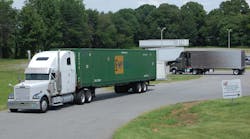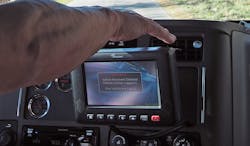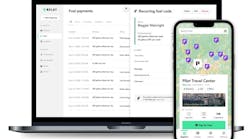Electronic logging devices (ELDs), key trade deals, companies like Uber stepping into the game, and the timeline for autonomous trucks are the major issues industry analysts are keeping their eyes on right now. And according to two experts at FTR, these disruptions are happening amid a turbulent political climate, which adds uncertainty to their projections.
During FTR’s June 8 webinar on the key issues in transportation, Eric Starks, CEO & chairman of FTR Intelligence, and Larry Gross, transportation expert at FTR, noted we’re currently seeing economic growth and a bit of excess inventory in an environment of uncertainty.
“Right now, we’re seeing growth,” Starks said. “That suggests we’re in a relatively healthy environment. Is this a short term blip or will we start seeing fundamental growth? Right now we don’t see that looming recession around the corner, but that doesn’t mean it couldn’t be happening.”
Gross added that there is uncertainty with the current turbulent political situation, but noted that FTR experts try to leave politics out of the equation when developing their monthly state of freight forecasts.
“We look at things like the stock market which is right now forecasting a more robust growth than we were anticipating,” he said. “What we’re forecasting is there’s not going to be a whole lot of change in terms of the tax policy or in any artificial boosting of the economy in terms of spending.”
Disruptions ahead
Starks and Gross mentioned the most significant trade disruption ahead that could impact freight flows for trucking and intermodal is NAFTA (the North American Free Trade Agreement).
“This is one of the areas that the Trump administration can make moves without a lot of congressional input or insight,” Gross explained. “We’ve seen some saber rattling in terms of NAFTA.”
He added that Trump’s threats to withdraw from or renegotiate NAFTA have already impacted cross-border moves between the U.S. and Canada and Mexico. “In general we see a lot more downside in terms of disruption of cross-border trade rather than upside,” according to Gross.
“Right now NAFTA is our major concern,” Starks said. “Where Mexico and Canada are much more uneasy about things, the likelihood that things could change over the next several years is higher. What does that freight movement look like? It’s really hard to tell what that full impact is. That’s what we’re looking at closely now.”
A more long-term disruption than NAFTA is the adoption timeline of autonomous trucks and the public acceptance that comes with that kind of disruptive innovation.
According to Starks, what we’re really talking about is threefold:
- What is the public acceptance when someone is driving down the road, but doesn’t see a driver sitting in the truck next to him or her?
- What’s the fleet's willingness to invest? Will it be price competitive?
- What’s the fleet’s return on investment?
“When folks are thinking about the fully autonomous truck, that’s probably way off,” Gross explained. “The thing to focus on is there are intermediate steps to focus on with trucking economics. The gateway technology is the platooning approach. This is a technology that can be adopted on a widespread basis purely on the fact of the fuel savings it generates. That’s enough to finance the technology.”
However, at some point with platooning, Gross added, fleets are going to ask themselves if they really need a driver in the second or third vehicle of a platoon. “It will essentially be a road train where maybe only the first truck of a platoon of two or three trucks is manned by a driver,” he noted.
Disintermediation and the Amazon affect
When it comes to the elimination of financial intermediaries such as banks and brokers in transactions between principals, Starks said this is purely a technology play.
“The likelihood that this technology advances over the next few years is big,” he stated. “With Uber jumping in, does it radically change how the industry behaves? How quickly does it then change? This will be very interesting as they launch this new product.”
But Gross said he thinks it’s a bit of an overstatement to say that Uber is going to blow up the business because booking a load isn’t the same as booking a taxi.
“I’m a little bit more skeptical I think in terms of these disruptive forces in terms of how they will add value on how freight is purchased here,” Gross stressed. “When you’re going to get a load of $400,000 worth of product, you’re going to want to know a little but more about the person that you’re giving it to. I think there will be a lot of work here to do going forward.”
Furthermore, Starks stressed that this type of innovated technology excites another pool of potential people who are employable in the industry and it becomes an attraction to people who wouldn’t otherwise consider a job in the transportation industry.
Regarding e-commerce and the Amazon affect, “The final mile is probably one of the biggest problem the transportation industry has to deal with in next few decades,” Starks explained. “When looking at terms of productivity this is where fleets can have the biggest bang for their buck. We’re seeing different things happening with drones, and in some areas it makes sense to use some drones.”
“What is the most efficient way to get this good to our end customer,” he added. That technology is still in an evolutionary phase. That will evolve over time.”
This is another area that is keyed off not only technology, but transportation infrastructure as well.
“My expectations were [the Trump administration] would move fairly quickly on infrastructure and they’ve since put that on the back burner and moved onto other things that were more difficult,” Starks said. “A lot of things are happening, but seeing a true transportation bill is very unlikely.”
“Right now the likelihood that we see a significant spend on transportation infrastructure – if we can see a true bipartisan support and its put into things like bridge and road and construction – could have a noticeable effect,” Starks added.
“I was always on the skeptical side in the chances of pulling of a trillion dollar infrastructure spend,” Gross said. “As a political observer, I saw in the House, folks not willing to get on board a significant spend on infrastructure. We can’t even get a fuel tax raised, and the industry wants it to happen. Infrastructure currently being discussed is more smoke and mirrors than reality.”
ELDs, Trump’s impact on safety
Right now, capacity shortage concerns abound amid the current regulatory environment. Starks noted he believes there will be a rollback on environmental and greenhouse gas regulations, but he said the main question is: What will the implementation and enforcement of ELDs look like?
“That enforcement could be very aggressive, and that has the ability to radically impact capacity dramatically,” Starks explained. “The timing really matters there.”
As to whether or not ELDs will further force drivers out of the industry, Starks said: “I know that it is going to be very painful for a segment of the population. The smaller carriers and owner operators will be hit. A lot of the people who have held off on the ELD have held off because they don’t want it or they run too many hours. I won’t be surprised if we do see some drivers walking away.”
Both Starks and Gross noted that we are still in a “wait-and-see” state as we look at the overall regulatory environment and what the priorities are in the new administration. With ELDs and the potential loss in productivity, Starks said there will be a push to get that productivity back, and fleets will likely start better optimizing technology and big data.
“Big data is only good if already know how to use the information you have,” Starks stressed. “If you don’t know how to use that information, big data won’t help you.”
Gross added that with a reduction in productivity comes a drive to replace it, which is where the truck size and weight debate comes into plat. “What you have on the table now is twin 33s,” he said. “We are in the realm of possibility of seeing twin 33s being legalized.”






